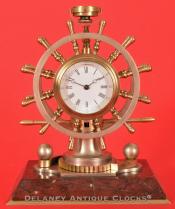French Industrial Series. A ratchet and ship's wheel novelty desk clock. 218023.
This very interesting clock was made in France circa 1890 and is associated with the work of A. R. Guilmet. This model is one of a series that shares industrial themes. This example features a nautical theme. The case is designed as a ship's wheel and is mounted on a ratchet. The ratchet is fitted with two pawls.
This case is constructed in brass and is brightly finished. The polished brass has been treated with a light lacquer protective finish, so it should tarnish very slowly. The top of the case design is fitted with a compass inside a gimbal mount. The central part of the case displays two separate dials mounted on opposite sides of the case. Both are protected by beveled glass. These dials include a time dial for the clock mechanism and a barometer. Both dials are porcelain, and their scales are finished in black. The contrast is easy to read. The timepiece is spring-wound and designed to run for 8-days fully wound. The time mechanism is behind the dial inside the case. The case is supported on a pedestal mounted on a ratchet. This ratchet turns in one direction. The robustly fitted pawls prevent one from manually turning the clock in the other direction. This is fitted on a red marble base and a brass pad. This clock has a very interesting look and is an easy conversation starter.
For additional information about this clockmaker, please read Derek Roberts' book "Mystery, Novelty, and Fantasy Clock."
This clock stands approximately 8.5 inches tall. The base pad is 7 inches wide and 4.5 inches deep.
Inventory number 218023.
André Romain Guilmet was born on the 10th of December 1827 in La Ferté-Gaucher, France. He is best in the world of horology as a manufacturer of mystery clocks and clocks that feature an industrial theme. He is also credited as a watchmaker and inventor. He applied for several patents for designs. One of the more well-known applications relates to the bicycle. It was his idea to put the driving chain below the seat. His most popular "mystery clock" (mysteries with glass pendulum) was that of a woman who held a pendulum in her outstretched hand and arm. She is usually positioned standing on a marble base with a clock below. The pendulum is impulsed by the mechanism underneath her that moves the figure imperceptibly from side to side. The industrial series of clocks features automated clocks in the form of windmills, lighthouses, automobiles, boats, steam hammers, boilers, etc. All of which are excellent quality.
For additional information about this clockmaker, please read Derek Roberts' book titled "Mystery, Novelty and Fantasy Clock."










